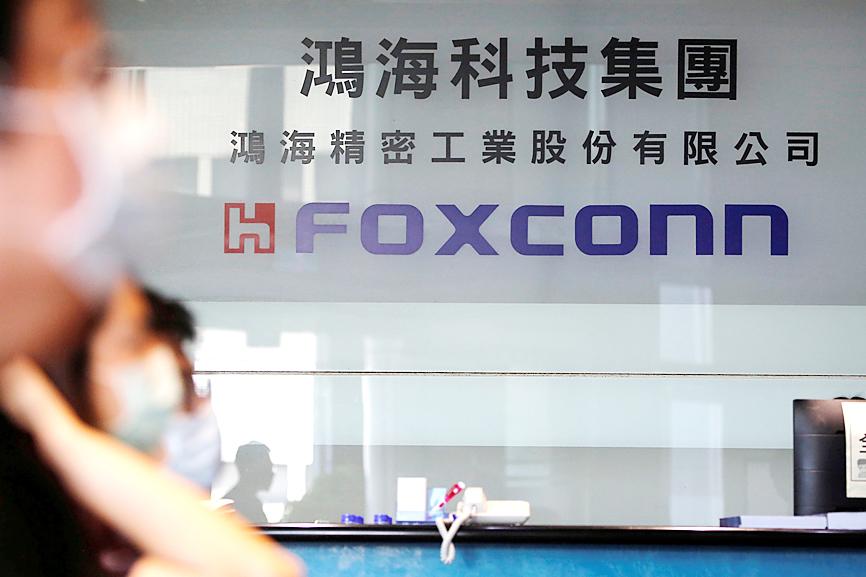Hon Hai Precision Industry Co (鴻海精密), a major assembler of Apple Inc’s iPhones, yesterday posted a 5.95 percent monthly decline in consolidated revenue to NT$550.89 billion (US$19.76 billion) for last month, as industry-wide component shortages caused a slowdown in production.
However, demand remains healthy, Hon Hai said.
Last month’s revenue was down 10.07 percent from a year earlier.

Photo: Ann Wang, Reuters
“People are waiting in line to buy our customers’ products,” the company said. “Demand is still there, and we see the parts-shortage crisis turning a corner.”
Revenue in the first 10 months of the year rose 17.53 percent to NT$4.655 trillion over the same period last year, hitting a historical high.
In terms of Hon Hai’s four main product groups, cloud and networking products grew the most month-on-month, followed by smart consumer electronics, components and computing products, Hon Hai said.
In terms of annual growth, components led the growth, followed by consumer electronics, cloud computing and computing products.
Monthly computing products sales might also have weakened in comparison to September’s back-to-school bump, the company said, adding that its “cautiously optimistic” projections for the fourth quarter are holding.
“We have not heard as much news about the COVID-19 pandemic in Vietnam or Malaysia, and no news is good news,” the company said.
Separately, iPhone camera module supplier Largan Precision Co (大立光) said revenue rose 0.74 percent month-on-month to NT$4.2 billion.
Although it was down 18.26 percent year-on-year, it was Largan’s highest month of revenue for nine months and set the company up for the fourth quarter being its strongest this year if revenues remain on track.
About 50 to 60 percent of Largan’s sales came from lenses with a pixel count of more than 10 megapixels. Eight-megapixel lenses and smaller accounted for about 10 to 20 percent, while the high-end market for lenses of more than 20 megapixels accounted for about 20 to 30 percent of sales.
Largan has been struggling all year with supply-chain issues and with some of its high-end lenses being too advanced for companies seeking a second source. The company is in the middle of a stock buyback to rally the price, which slid to NT$2,005 at yesterday’s close.
Industrial computer maker Advantech Co Ltd (研華) reported NT$5.01 billion in sales for last month, up 30.74 percent year-on-year. The company’s revenue for the first 10 months of the year reached NT$47.89 billion, up 13.55 percent year-on-year.
The company said that it experienced strong growth in all regional markets last month, especially North America, South Korea and Taiwan.

Taiwan Transport and Storage Corp (TTS, 台灣通運倉儲) yesterday unveiled its first electric tractor unit — manufactured by Volvo Trucks — in a ceremony in Taipei, and said the unit would soon be used to transport cement produced by Taiwan Cement Corp (TCC, 台灣水泥). Both TTS and TCC belong to TCC International Holdings Ltd (台泥國際集團). With the electric tractor unit, the Taipei-based cement firm would become the first in Taiwan to use electric vehicles to transport construction materials. TTS chairman Koo Kung-yi (辜公怡), Volvo Trucks vice president of sales and marketing Johan Selven, TCC president Roman Cheng (程耀輝) and Taikoo Motors Group

Among the rows of vibrators, rubber torsos and leather harnesses at a Chinese sex toys exhibition in Shanghai this weekend, the beginnings of an artificial intelligence (AI)-driven shift in the industry quietly pulsed. China manufactures about 70 percent of the world’s sex toys, most of it the “hardware” on display at the fair — whether that be technicolor tentacled dildos or hyper-realistic personalized silicone dolls. Yet smart toys have been rising in popularity for some time. Many major European and US brands already offer tech-enhanced products that can enable long-distance love, monitor well-being and even bring people one step closer to

RECORD-BREAKING: TSMC’s net profit last quarter beat market expectations by expanding 8.9% and it was the best first-quarter profit in the chipmaker’s history Taiwan Semiconductor Manufacturing Co (TSMC, 台積電), which counts Nvidia Corp as a key customer, yesterday said that artificial intelligence (AI) server chip revenue is set to more than double this year from last year amid rising demand. The chipmaker expects the growth momentum to continue in the next five years with an annual compound growth rate of 50 percent, TSMC chief executive officer C.C. Wei (魏哲家) told investors yesterday. By 2028, AI chips’ contribution to revenue would climb to about 20 percent from a percentage in the low teens, Wei said. “Almost all the AI innovators are working with TSMC to address the

FUTURE PLANS: Although the electric vehicle market is getting more competitive, Hon Hai would stick to its goal of seizing a 5 percent share globally, Young Liu said Hon Hai Precision Industry Co (鴻海精密), a major iPhone assembler and supplier of artificial intelligence (AI) servers powered by Nvidia Corp’s chips, yesterday said it has introduced a rotating chief executive structure as part of the company’s efforts to cultivate future leaders and to enhance corporate governance. The 50-year-old contract electronics maker reported sizable revenue of NT$6.16 trillion (US$189.67 billion) last year. Hon Hai, also known as Foxconn Technology Group (富士康科技集團), has been under the control of one man almost since its inception. A rotating CEO system is a rarity among Taiwanese businesses. Hon Hai has given leaders of the company’s six